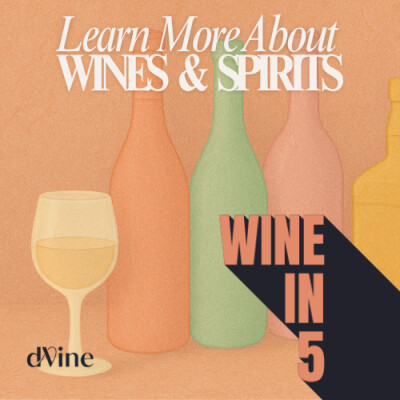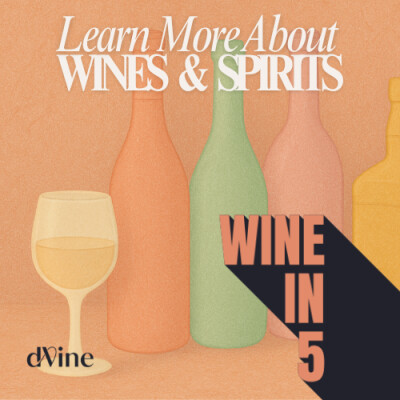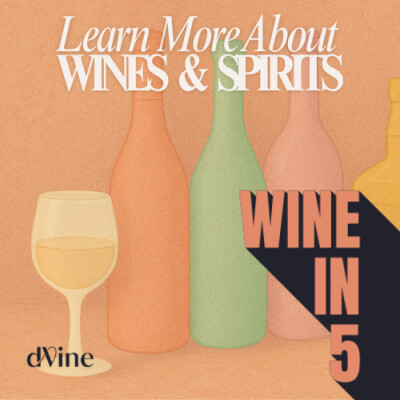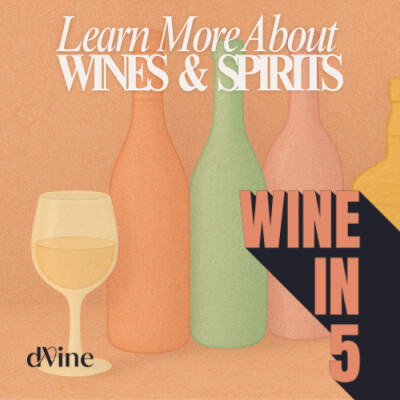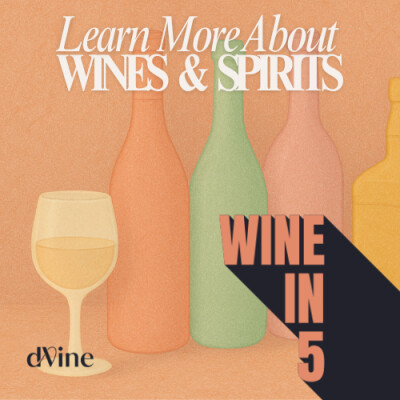- Speaker #0
Welcome to Wine in 5, the podcast to discover the world of wine and to develop your knowledge. Hello, my name is Beatrice Dominique, I'm the Enologist of Divine. And today we are starting a new version of this podcast. I'm quite happy to do it in English, and I'm even more happy to do it with Alistair Cooper, Master of Wine. Good morning, Ali.
- Speaker #1
Good morning, Vitrice. Thank you for having me. I'm quite pleased it's in English, too. So, it's great to be here. Thanks for having me.
- Speaker #0
Okay. So, you're Master of Wine. I'm an enologist. We're both passionate about wine. So obviously we're going to talk about wine.
- Speaker #1
I think that makes a lot of sense. Yeah, I think we've got lots of things in common and lots of things to get into today.
- Speaker #0
And, you know, when we talk about wine, we describe wine, we do it in a professional way. Lots of people enjoy wine, but very often they're quite lost if we ask them what they think about wine. How would you recommend or what would you do to make them more comfortable about tasting?
- Speaker #1
It's a good question. You know, I think we've probably both been there i'm sure you were there as well at the very beginning when you develop an interest in wine you're interested in the taste but it can be quite a daunting subject you know looking at wine and trying to learn how to explain it i remember going to my first professional wine tasting as an amateur sort of and being really overwhelmed being a little bit embarrassed almost not to to be scared to say things so i'd say to people don't ever don't ever worry about being wrong and it is a question of learning i think you learn with With time, you learn the vocabulary. With the world of wine, there's a vocabulary that you learn after a while. But I'd say don't ever be afraid to make a mistake or say what you think, I think, is a key fundamental to start with.
- Speaker #0
Yeah, because tasting wine is personal. So I can have an opinion about a wine. You could have it differently. The only thing I was thinking is maybe...
- Speaker #1
to help them is have a frame in a sort that to help that we start with by looking at the color of the wine that gives a couple of information then the the aromas are on the nose and on the palettes yes yeah there is there's a structural way of tasting and of course when you when you begin to get into it a little bit more seriously it's always important as with anything as with driving a car you learn sets of rules and i think that's key you look at the start with the color and then you smell the wine and then you taste the wine and i think it's really important to be systematic to begin with to get the framework behind wine so yeah I would say looking at the wine so if we take those elements looking at the wine you can tell quite a lot about the wine perhaps what grape variety it is you might be able to tell if it's had oak or not you might be able to tell how old it is and these things all come with experience of understanding of what happens in the glass and then smelling the wine can give you a huge information about what the grape variety might be and whether you enjoy those first thing is it should be enjoyable do you enjoy that wine And I think if you're an amateur, And then tasting the wine as well, we go one step further. And then it's being systematic.
- Speaker #0
Yeah, and there's a question of memory as well, because actually, as you say, by the time you do more tasting, you remember the wine you've tasted first and you compare them. I always say, try to remember last time you tasted a wine. And was it darker? Was it clearer? Was it more powerful? and all the time, if you compare, you make like in your head i would say a lots of information cards and try to remember them to use them again on your next tasting And what's really important on that point is to make a note of it is actually to write these things down because the amount of people who've come to me and said oh i had a beautiful wine the other day it was a and they can't remember what they can't give me any info i think it was from spain what you know and you need to if you if you're beginning to get into wine. write things down if you find something you'll take a picture on your iphone now take a picture of what it was and make a note of what it was you liked about it and then you build up that context and that's exactly right as you say to remember what you had last time write it down and then build up a category a sort of library in effect of what you like and then you can explore other things because there are wines that have similarities stylistically so if you like A Muscadet, you might like an Albariño or a Gruner Veltliner or something. So you build up what it is you like and you can go from there. Yeah, that's right. And because sometimes people think, oh, it's not funny when I drink wine, I don't think too much, I just enjoy. But if you want to, I would say, be more like a professional, if you want to improve on your capacity to describe wine, I think you have to go through that process of writing and remembering. Because obviously, at the end of the day, what's important with wine is you enjoy it. That's right.
- Speaker #1
And that's the decision to make. Are you just in it to enjoy it? And that's absolutely fine, and that's the majority of people. Enjoy the wine. But if you want to take it further and learn about wine and get deeper into it, make a note and be structured with what you're doing, and that's the way to go forward, I think.
- Speaker #0
Well, I think that's the perfect conclusion there, Alistair. Thank you very much for talking to me this morning. Thank you.
- Speaker #1
Bye-bye. Bye-bye.
